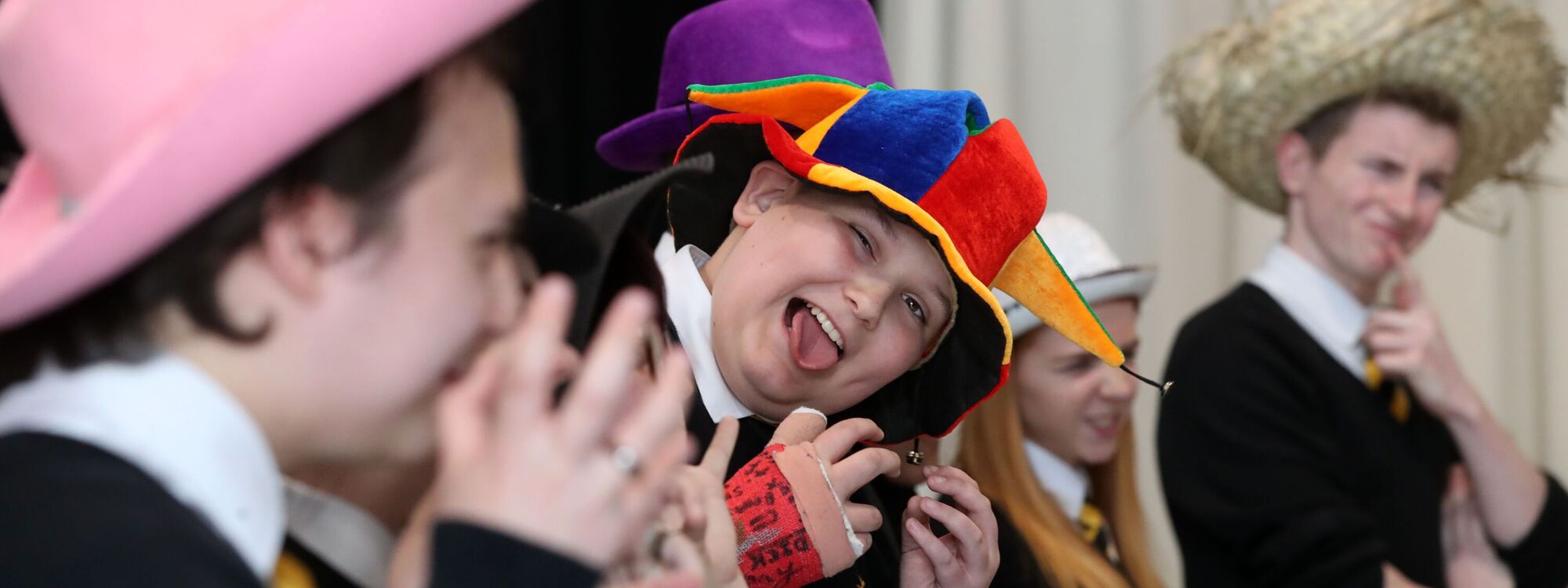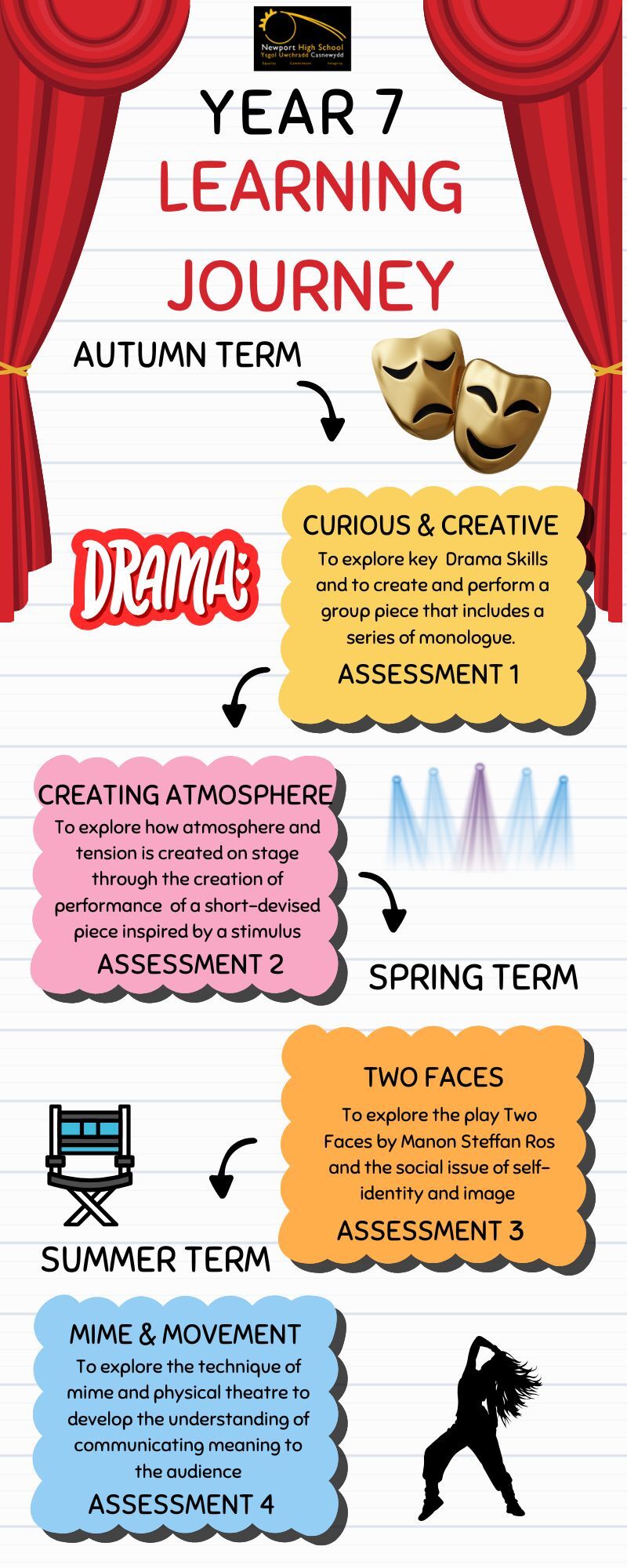
- Home
- Curriculum
- Faculty Structure
- Create
Create
BackArt & Design
Create Area of Learning
Art Route
Within Create the Art Department at Newport High School offers a broad and enriched curriculum where pupils are encouraged to learn key elements of Art with increasing independence. Pupils will explore cross-curricular links and personal themes and will become inspired by studying and analysing the work of other artists, designers and photographers.
Opportunities available during the course:
- Develop specific art skills in depth.
- Explore different materials in creative and imaginative ways.
- Develop and understanding of real-life contexts for work through the investigations of other artists and designers.
- Make personal connections to Art through culture.
- Build confidence, self-discipline and commitment.
Statements of What Matters
- Exploring the expressive arts is essential to developing artistic skills and knowledge and it enables learners to become curious and creative individuals.
- Responding and reflecting, both as artist and audience, is a fundamental part of learning in the expressive arts.
- Creating combines skills and knowledge, drawing on the senses, inspiration and imagination.
Rise Up Transition
Progression points
In Art progression over time is monitored through the skill development of creating, interpreting, designing and responding. Through midpoint teacher judgements and end point assessments progress is assessed using progression rubrics to determine the increasing effectiveness of each learner. This is demonstrated in moving from doing something with support at the baseline towards becoming more independent and confident when applying different skills. Progression in learning is monitored through the gradual use and re-use of the 4 skills outlined below:
- Create and develop ideas to communicate personal and meaningful Art (Create)
- Apply key elements of Art to realise artistic intentions when creating an outcome (Interpret)
- Demonstrate knowledge and understanding of skills through exploring different contexts and how they can inspire planning (Design)
- Analyse and evaluate their own work and the work of others. (Respond)
Year 7

Year 8

Year 9

GCSE Art and Design – Art
Exam Board – WJEC
Coursework (60%) – To present an Art sketchbook along with final outcomes based on a given theme. Final outcomes can include: paintings, sculpture, prints, batiks and collage. (September – January)
Externally Set Assignment (40%) - Second sketchbook on the chosen theme set out by WJEC followed by a 10-hour examination to produce a final outcome (January – May)
Theme and Projects
- Year 10 – Identity (skill based)
- Year 11 – Identity and Culture (personal enquiry)
- Exam Theme – Set out by WJEC
GCSE Art and Design – Photography
Exam Board – WJEC
Coursework (60%) – To present a photography PowerPoint with experimentation and research along with final outcomes based on a given theme. Final outcomes can include: final images edited on Photoshop, installation work. (September – January)
Externally Set Assignment (40%) - Second PowerPoint on the chosen theme set out by WJEC followed by a 10-hour examination to produce a final outcome (January – May)
Theme and Projects
- Year 10 – Happy & Sad (skill based)
- Year 11 – Personal representation of emotions (personal enquiry)
Exam Theme – Set out by WJEC
AS / A2 LEVEL Art and Design – Art
Exam Board – WJEC
AS Unit 1 – Personal Creative Enquiry. Non-exam assessment worth 40% of A level qualification. To present an Art sketchbook along with final outcomes based on a given theme. Final outcomes can include: paintings, sculpture, prints, batiks and collage. (September – May of year 12)
Themes and Project – Where I Belong / Beneath The Surface
A2 Unit 2 – Personal Investigation. Non-exam assessment worth 36%. To investigate in depth your project/themed based sketchbook and outcomes with critical and contextual analysis of 1000 words minimum (May of year 12 – January of year 13)
Theme – Issues
Unit 3: Externally Set Assignment. Non-exam assessment worth 24% of qualification. To present a sketchbook and final outcomes on the chosen theme set out by WJEC followed by a 15-hour examination to produce a final outcome (January – May of year 13)
Theme – Set out by WJEC
AS / A LEVEL Art and Design – Photography
Exam Board – WJEC
Exam Board – WJEC
AS Unit 1 – Personal Creative Enquiry. Non-exam assessment worth 40% of A level qualification. To present a PowerPoint along with final outcomes based on a given theme. Final outcomes can include: final photos on Photoshop or installation work (September – May of year 12)
Themes and Project – Where I Belong / Beneath The Surface
A2 Unit 2 – Personal Investigation. Non-exam assessment worth 36%. To investigate in depth your project/themed based PowerPoint and outcomes with critical and contextual analysis of 1000 words minimum (May of year 12 – January of year 13)
Theme – Issues
Unit 3: Externally Set Assignment. Non-exam assessment worth 24% of qualification. To present a PowerPoint on the chosen theme set out by WJEC followed by a 15-hour examination to produce a final outcome (January – May of year 13)
Theme – Set out by WJEC
Useful Links
WJEC GCSE – https://www.wjec.co.uk/qualifications/art-and-design-gcse#tab_keydocuments
WJEC A Level - https://www.wjec.co.uk/qualifications/art-and-design-asa-level/#tab_keydocuments
Virtual Gallery Space
Virtual Gallery Space
Drama
Create Area of Learning
Drama Route
In Drama, curriculum design considers the 3 What Matters statements holistically through purposefully planned creative processes (learning episodes) The dynamic nature of the expressive arts means that the drama curriculum considers a range of stimuli and techniques as well as styles, genres and creative texts across all disciplines and spanning people, places, cultures and time. Planned opportunities for critical appreciation and response as well as experiences of actual and virtual venues to engage with live theatre performance.
What Matters
- Exploring the expressive arts is essential to developing artistic skills and knowledge and it enables learners to become curious and creative individuals.
- Responding and reflecting, both as artist and audience, is a fundamental part of learning in the expressive arts.
- Creating combines skills and knowledge, drawing on the senses, inspiration and imagination.
Progression points
In Drama progression over time is monitored through the skill development of creating, interpreting, performing and responding. Through midpoint teacher judgements and end point assessments progress is assessed using progression rubrics to determine the increasing effectiveness of each learner. This is demonstrated in moving from doing something with support at the baseline towards autonomy and sophistication of the skill. Progression in learning is monitored through the gradual use and re-use of the 4 skills outlined below:
- Create and develop ideas to communicate meaning for theatrical performance (Create)
- Apply theatrical skills to realise artistic intentions in live performance (interpret)
- Demonstrate knowledge and understanding of how drama and theatre is developed and performed (perform)
- Analyse and evaluate their own work and the work of others. (respond)
Discipline-specific considerations
Drama includes acting, directing, design, technical theatre and arts administration has experiences, knowledge and skills that increase in levels of complexity across the learning continuum. These include:
- plot, character, thought, relationships (which encompasses interaction), tension, focus, place, time, language, voice (which encompasses accent, diction, pitch, tempo, pauses), movement (which encompasses gesture, facial expressions), proxemics, atmosphere, mood, symbols, design which encompasses stage lighting, sound, set, hair, make-up, costume, script writing, directing and stage management
- comedy, tragedy, tragicomedy, farce, musical theatre, melodrama, mime, physical theatre

Music
Music
Design & Technology
Design & Technology